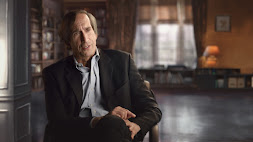The Human Factor is a remarkable new documentary and the first feature film from Israeli director Dror Moreh, since his previous award-winning movie, The Gatekeepers (2012). That film – about Israel’s highly secretive internal security service Shin Bet (whose motto translates as “Defender that shall not be seen”) - was told from the perspective of the organization’s former leaders, all of whom were interviewed for the story. It was one of the five films nominated for an Oscar in the ‘Best Documentary Feature’ category in 2013 (the winner, improbably, was Searching for Sugar Man). Kenneth Turan of the LA Times called The Gatekeepers “[a] documentary potent enough to alter how you see the world", and A.O. Scott of the NY Times praised its “rare, welcome and almost unbearable clarity.”
With The Human Factor Moreh has another fascinating – and in some ways more universally significant – tale to tell. The film explores the behind-the-scenes story of the thirty-year effort to broker a peace agreement in the Israeli-Palestinian conflict from a unique and revealing perspective: that of the American mediators – the persevering, indefatigable peacemakers who worked clandestinely and for the most part anonymously to persuade and assist the leaders of the two sides to find a mutually acceptable settlement.
The primary focus is the febrile yet hopeful decade from 1991 - after the collapse of the USSR and the US victory over Iraq in the First Gulf War made America the paramount, seemingly most influential nation in the world - through 2000-2001, spanning the presidencies of George H.W. Bush and Bill Clinton, the PLO presidency of Yasir Arafat, and five Israeli prime ministers: Shamir, Rabin, Peres, Netanyahu and Barak. Then, a combination of events – the collapse of the Camp David peace talks in July 2000; the beginning of the Second Intifada [Palestinian uprising] that September (a reaction to Israeli P.M. Sharon’s provocative visit to Jerusalem’s Al Aqsa Mosque); and the al Qaeda terrorist attacks on the US of September 11, 2001 which shifted America’s focus on the Middle East in a different direction - put the kibosh on any further prospects for progress on peace discussions.
You may think you know this story. You may believe you know why the hoped-for peace agreement nevermaterialized and even whose fault it was. But you likely don’t know the inside story, and some of what you believe may be wrong. The narrative, as presented in The Human Factor is revealing and insightful, remarkable and, at times, astonishing. Like the title suggests, this is a story not only about power and politics, not only about issues, but also of personalities, of emotions and of human vulnerability and fallibility. Indeed, the failure of the process may well have hinged as much on the personal as anything.
There are plenty of What Ifs. What if Rabin had not been assassinated? What if Barak, in 2000, had not angered and humiliated Arafat by prioritizing the negotiation of a peace treaty with Syria first – negotiations which ultimately failed to produce an agreement - over negotiations with Arafat’s PLO? What if Israel had not insisted on sole sovereignty over the Temple Mount in Jerusalem, location of the Al Aqsa Mosque and one of the three holiest places in Islam? What if the US mediators were not all Jewish?
As with The Gatekeepers, this story is told in large degree via interviews with the main American emissaries – which is to say not from the mouths of the Palestinian, Israeli or American politicians, but from folks without their political agendas, the mediators. The filmmaker also had access to a trove of previously undisclosed White House photographs that depict what was really going on and how the participants, including folks like Secretary of State James Baker, President Clinton, Yasir Arafat, PMs Yitshak Shamir, Yitshak Rabin, and Ehud Barak exult in the breakthroughs on the one hand and cope with the difficulties and failures on the other. Most prominent among the American mediators featured in the documentary are Dennis Ross, a Middle-East expert and diplomat, advisor to five presidential administrations (Carter, Reagan, Bush[41], Clinton, and Obama), Clinton’s Middle East “Special Envoy” and leader of America’s negotiation team during the key events of the decade; Martin Indyk, US Ambassador to Israel from 1995 – 2001 and a key figure in the late 90s negotiations; Aaron David Miller, from 1980 the State Department’s expert in Palestinian politics and Arafat’s PLO and from 1993, Ross’s senior deputy; and Robert Malley, Special Assistant to President Clinton for Arab-Israeli Affairs and a key organizer of the 2000 Camp David Summit.For all these guys, the work was a mission of peace, one that they knew was important for the Middle East and the world, and one that each of them took very personally. Ultimately, and crushingly, their efforts failed. Each brings to the commentary not only an insider’s knowledge of what was really going on but the benefit of two decades of astute, informed hindsight. They speak with great openness and understanding about what happened and about their deep regrets.I say: you really should check this one out. Here is a link to the film’s official trailer.
106 minutes
Grade: A
Released May 7, 2021 in select theaters. In the Bay Area at SF’s Landmark’ Embarcadero Center, Berkeley’s Rialto Elmwood, San Jose’s AMC Saratoga 14 and Santa Rosa’s Summerfield Cinemas. Follow this link [then click “Buy Tickets”] to find a theater near you.






No comments:
Post a Comment